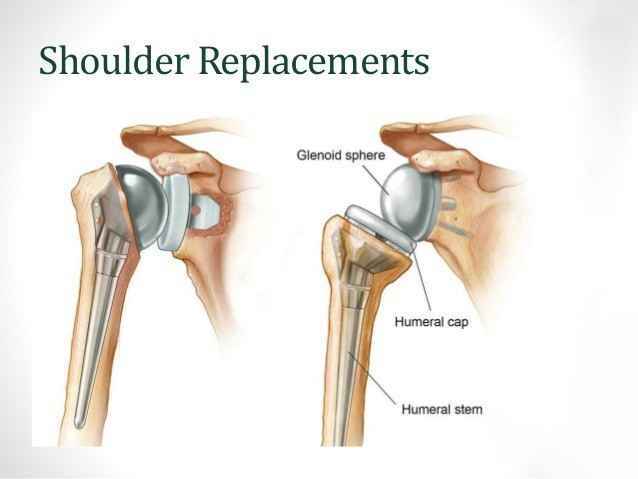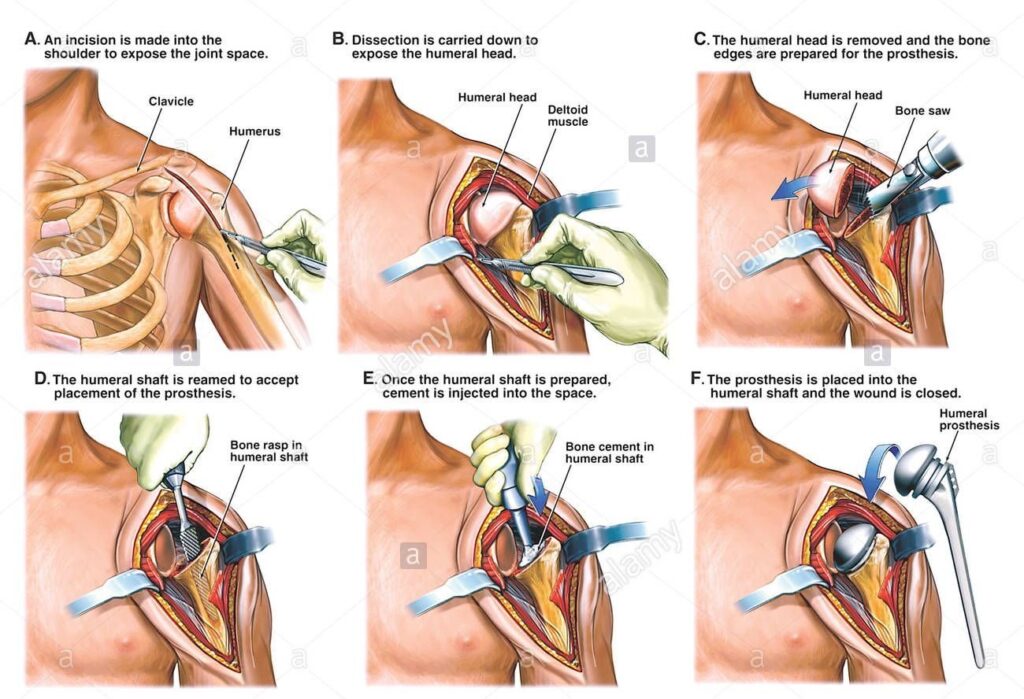Your shoulder is made of three bones – upper arm bone, shoulder blade and collar bone. The shoulder joint is also a “ball and socket” joint. The ball from the upper arm bone joins the socket on your shoulder blade. The surfaces are covered with cartilage and is lubricated by tissues to eliminate any friction in your shoulder. All these along with muscles allow the shoulder to work perfectly with grater motion than any other body part.

Total shoulder arthroplasty or replacement is one of the most successful joint replacement surgeries done. The damaged surfaces come into contact with each other and this causes pain and restriction of movements of the shoulder. The surgery is mainly intended to relieve pain and restore mobility of the shoulder.
Shoulder replacement removes the damaged areas of bone and replaces them with parts made of metal & plastic implants. Shoulder implants can be partial or total and comes in few different shapes and sizes. A surgery can take up to a couple of hours and your stay duration will depend on individual needs, generally less than a day.
Your orthopaedic surgeon will review the results of your evaluation with you and discuss whether shoulder joint replacement is the best method to relieve your pain and improve your function. Other treatment options including medications, injections, physical therapy, or other types of surgery will also be discussed and considered.

You will need the sling to support and protect your shoulder for the first 2 to 6 weeks after surgery, depending on the complexity of your surgery and your surgeon’s preference. Wearing a sling will protect your shoulder after surgery. You will have staples running along your wound or a suture beneath your skin. The staples will be removed several weeks after surgery. A dissolving suture beneath your skin will not require removal.
Avoid soaking the wound in water until it has thoroughly sealed and dried. You may continue to bandage the wound to prevent irritation from clothing.
Exercise is a critical component of home care, particularly during the first few weeks after surgery. Follow your surgeon’s home exercise plan to help you regain strength. Most patients are able to perform simple activities such as eating, dressing, and grooming, within 2 weeks after surgery. Some pain with activity and at night is common for several weeks after surgery.
You are not allowed to drive a car for 2 to 6 weeks after surgery.
Don’t use the arm to push yourself up in bed or from a chair because this requires forceful contraction of muscles.
Do follow the program of home exercises prescribed for you. You may need to do the exercises 2 to 3 times a day for a month or more.
Don’t overdo it! If your shoulder pain was severe before the surgery, the experience of pain-free motion may lull you into thinking that you can do more than is prescribed. Early overuse of the shoulder may result in severe limitations in motion.
Don’t lift anything heavier than a glass of water for the first 2 to 4 weeks after surgery.
Do ask for assistance. Your physician may be able to recommend an agency or facility to help if you do not have home support.
Don’t participate in contact sports or do any repetitive heavy lifting after your shoulder replacement.
Do avoid placing your arm in any extreme position, such as straight out to the side or behind your body for the first 6 weeks after surgery.
The potential complications of the shoulder replacement surgery include:
It depends on the condition of the joints and tissues around which can be diagnosed through x-rays and other tests. Medication and pain killers will be tried to relive you of the pain but if it doesn’t subside, shoulder replacement will be the option.
No, age is not a restriction for shoulder replacement surgery. The decision depends on the condition of the shoulder joint, overall health, and medical needs of the patient — not the age.
Doctors instructions have to be followed diligently and utmost precautions have to be taken for you to get back to normal pain free lifestyle. There has to be a gradual and persistent progress in physical activities which might take upto 12 months post-surgery.
The average cost of shoulder replacement is around 1 lakh & can go upto 2.5 lakhs depending on multiple factors like method of surgery, implants, replacement kind and hospital stay.
In most cases, yes. Shoulder replacement surgery is generally covered under health insurance if it is medically necessary and recommended by your doctor. Coverage may vary depending on your insurance provider, type of policy, and whether the hospital is part of the insurance network. It is always best to check with your insurance company in advance for exact coverage details.